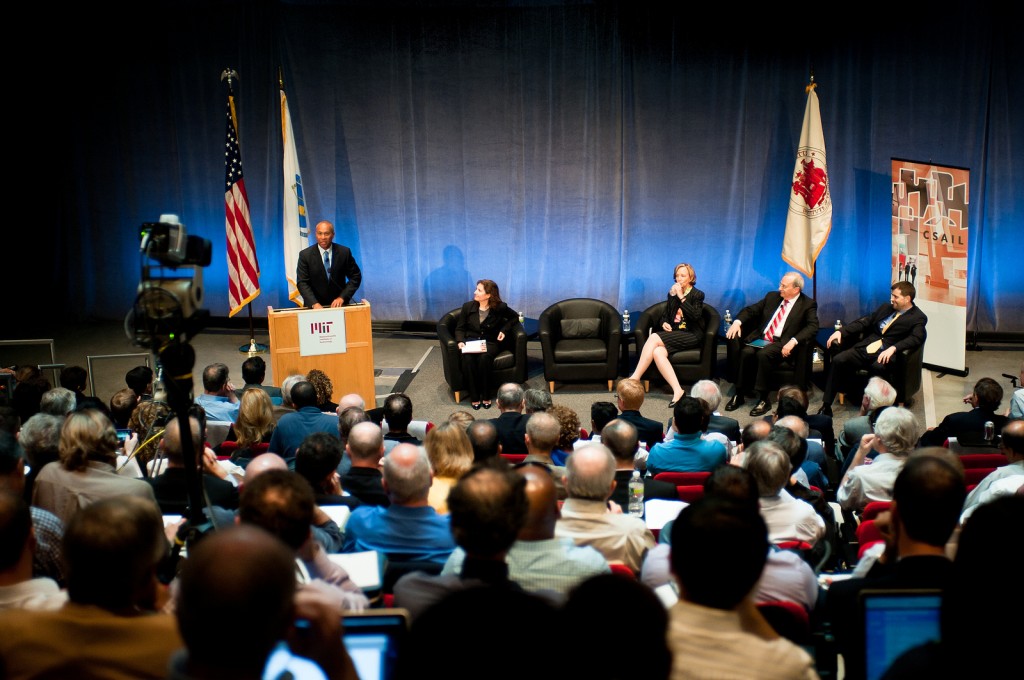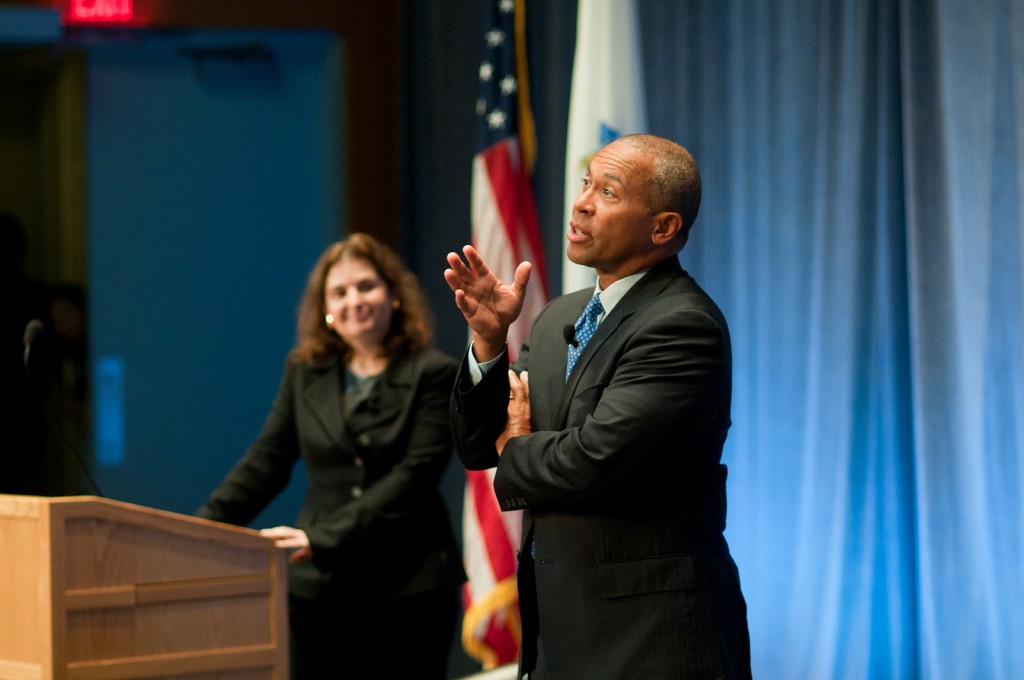CAMBRIDGE – Wednesday, May 30, 2012 – Governor Deval Patrick today announced the creation of the Massachusetts Big Data Initiative, a number of steps and initiatives that will expand Massachusetts’ position as a world leader in the rapidly expanding Big Data sector.

Governor Patrick announces the Massachusetts Big Data Initiative to grow the state’s innovation economy. (Photo: Jeremiah Robinson / Governor’s Office).
Big Data is the collection and analysis of large amounts of data, a growing information technology need as companies seek solutions to easily handle data across a broad spectrum of industries and uses such as genomics, climate change, cancer research, health care cost reduction, smart grids and other topics.

(Photo: Jeremiah Robinson / Governor’s Office)
“Our Massachusetts Big Data Initiative and private investment like Intel’s support of MIT’s CSAIL program will position Massachusetts as a leader in a growing, global industry and allow us to become the premier destination for big data,” said Governor Patrick.
| The Massachusetts Big Data Initiative will expand on the Commonwealth’s already strong Big Data presence. By combining business and academia into the initiative, Massachusetts will maintain a visible presence at the forefront of Big Data. The initiative calls for the creation of the Massachusetts Big Data Consortium, with an organizing committee led by academia and industry, to be facilitated by the Massachusetts Technology Collaborative. The Massachusetts Green High Performance Computing Center in Holyoke, a collaboration of the Commonwealth with MIT, the University of Massachusetts, Boston University, Northeastern, Harvard, Cisco and EMC, has designated the Computing Center a major public-private resource for the Big Data Initiative. |
Governor Patrick today also announced four additional steps that will help accelerate Massachusetts’ leadership in Big Data:
- The Massachusetts Technology Collaborative and the Massachusetts Big Data Consortium will create a research and development matching grant program devoted to Big Data;
- The Massachusetts Technology Collaborative will create a Big Data internship program modeled after the successful internship programs at the Massachusetts Life Sciences and Clean Energy Centers;
- The newly-created Governor’s Council for Innovation will work with the Big Data Consortium to see how data analytics and applications can help improve the efficiency and effectiveness of government programs and services; and
- The Massachusetts Technology Collaborative is becoming a sponsor, along with a number of Big Data companies and venture capital firms, of Hack/Reduce, an innovative non-profit community “hackspace” in Boston, where people working with Big Data can share infrastructure resources and knowledge.
Currently, Massachusetts has over 100 companies employing more than 12,000 people in Big Data, with another 58,000 data scientists and managers working in fields like health care, financial services and life science, according to the Massachusetts Technology Leadership Council. In 2011, Big Data companies received more than $350 million in venture capital, and in December 2011 Governor Patrick joined Massachusetts-based EMC for the groundbreaking of the company’s Big Data facility at Federal University in Rio de Janeiro during the Governor’s trade mission to Brazil.
“EMC is pleased to be a founding member of both the Massachusetts Big Data Consortium and MIT’s bigdata@CSAIL initiative. Big Data creates an extraordinary opportunity to transform business and society. Massachusetts, thanks to its world-renowned academic research institutions and strong presence in IT, biotech, and other technology fields, is extremely well positioned to capitalize on this trend,” said Jeff Nick, Senior Vice President and Chief Technology Officer, EMC Corporation. “These unique collaborations across government, private industry and academia will help the Commonwealth transform into a global hub for Big Data research and innovation while building upon its existing strength as a world leader in science and technology.”
“Big data is poised to be the next major technological wave and Massachusetts is well positioned to take the lead,” said Tom Hopcroft, president and CEO of the Mass Technology Leadership Council (MassTLC). “The Governor’s initiative will add a powerful force to our dynamic mix of established players, start-ups, customers, researchers, and investors.”
“Big Data Analytics is creating an inflection point for technology innovation, investment, and growth,” said Chris Lynch, a partner at Atlas Venture and a member of the Big Data Consortium’s organizing committee. “Governor Patrick’s leadership on all three of these areas was instrumental in the creation of hack/reduce and will ensure our success in attracting talent to the local communities, job creation, and ultimately our leadership position in today’s big data economy and beyond.”
“The potential for Big Data to impact society is significant only when we connect the many components required to realize it,” said Steve Papa, founder and CEO of Endaca, and a member of the Big Data Consortium’s organizing committee. “I believe Governor Patrick’s effort to catalyze alignment across the many unique Massachusetts assets will accelerate the development of the Big Data industry and the local economy that supports it.”
Massachusetts has already established itself as one of the leading centers of Big Data, building solutions that connect computational technology and analytics with immense information challenges. As a world leader in the innovation economy, expanding the Big Data sector in the Commonwealth will help create jobs and strengthen the state’s economy.
| Also today, Intel and MIT announced a five-year, $12.5 million partnership creating the bigdata@CSAIL endeavor at MIT. The bigdata@CSAIL initiative will bring together leaders from academia, industry and government to develop sophisticated techniques for capturing, processing, analyzing, storing and sharing big data, with the overall goal of making it more useful for society as a whole. Experts in hardware and software development, theoretical computer science, and computer security will come together to develop new architectures capable of sorting and storing massive quantities of information, as well as the algorithms that can process them. |
“A key strength in Massachusetts is our academic institutions,” said Mohamad Ali, former senior executive at IBM and Avaya, and current chairman of MassTLC. “Tomorrow’s knowledge economy will be driven by data scientists and data savvy managers. As evidenced by public and private initiatives such as the Intel Science and Technology Center at MIT, no other region is better situated to educate and grow tomorrow’s leaders.”
“With the bigdata@CSAIL initiative we aim to bring together leaders from academia, industry and government to develop a new generation of technologies to store, manage, analyze, share, and understand the huge quantities of data we are now collecting,” said Sam Madden, an associate professor in the Department of Electrical Engineering and Computer Science at MIT and leader of the “bigdata@CSAIL” initiative.